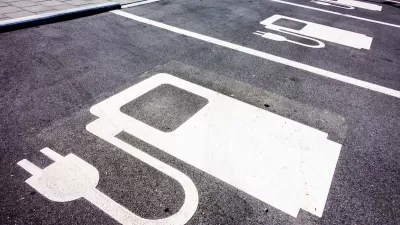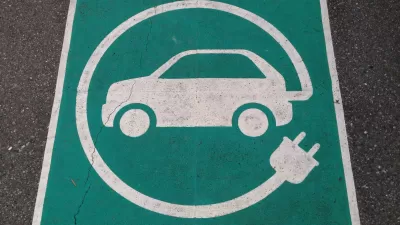Critics say the Postal Service's argument for its weak commitment to electrifying its vehicle fleet doesn't hold water.

Despite a mandate to electrify federal agency vehicle fleets by 2035, the U.S. Postal Service is only committing to replacing 10 percent of its delivery trucks with electric vehicles, a minimal pledge that sustainability advocates deem unacceptable. While the USPS revealed new, pedestrian-friendly truck designs last year, it appears most of them will still run on gas. As Kea Wilson reports, the agency, which operates the largest government-owned vehicle fleet in the nation, is citing financial and logistical challenges.
The agency claims that it would be difficult to keep EV batteries charged during long mail routes, but the Natural Resources Defense Council (NRDC) rejects this argument, pointing out that "fewer than 6 percent of U.S. mail routes are longer than 70 miles, while today’s electric cargo vans can already go 140 miles on a charge — a capacity that’s likely to go up as battery technology improves."
According to the article, linked below, the agency also fails to mention the possibility of introducing electric cargo bikes or tricycles for mail delivery in dense urban areas, despite their potential to slash emissions and cost. Advocates tout the environmental, financial, and public health benefits of switching to electric bikes and trikes where appropriate.
FULL STORY: RETURN TO SENDER: USPS Decarbonization Plan is Weak, Say Advocates

Planetizen Federal Action Tracker
A weekly monitor of how Trump’s orders and actions are impacting planners and planning in America.

Maui's Vacation Rental Debate Turns Ugly
Verbal attacks, misinformation campaigns and fistfights plague a high-stakes debate to convert thousands of vacation rentals into long-term housing.

Restaurant Patios Were a Pandemic Win — Why Were They so Hard to Keep?
Social distancing requirements and changes in travel patterns prompted cities to pilot new uses for street and sidewalk space. Then it got complicated.

In California Battle of Housing vs. Environment, Housing Just Won
A new state law significantly limits the power of CEQA, an environmental review law that served as a powerful tool for blocking new development.

Boulder Eliminates Parking Minimums Citywide
Officials estimate the cost of building a single underground parking space at up to $100,000.

Orange County, Florida Adopts Largest US “Sprawl Repair” Code
The ‘Orange Code’ seeks to rectify decades of sprawl-inducing, car-oriented development.
Urban Design for Planners 1: Software Tools
This six-course series explores essential urban design concepts using open source software and equips planners with the tools they need to participate fully in the urban design process.
Planning for Universal Design
Learn the tools for implementing Universal Design in planning regulations.
Heyer Gruel & Associates PA
JM Goldson LLC
Custer County Colorado
City of Camden Redevelopment Agency
City of Astoria
Transportation Research & Education Center (TREC) at Portland State University
Jefferson Parish Government
Camden Redevelopment Agency
City of Claremont





























